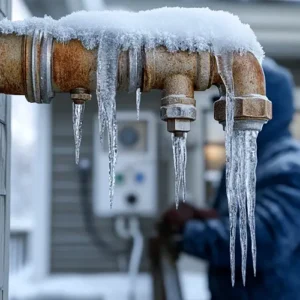 Why do pipes freeze?
Why do pipes freeze?
Pipes freeze when water expands due to the formation of ice during freezing temperatures. This expansion leads to blockages which cause water pressure to build up.
How can I keep my pipes from freezing?
The reality is that even well-insulated pipes can become exposed to cold air through tiny cracks and crevices, and even the most diligent of homeowners can find themselves without running water due to frozen and busted pipes. There are, however, a few ways to help prevent your pipes from freezing, and it’s worth your while to take some time preparing for the winter months to do everything you can to protect them. Trust us – it’s far less expensive to invest in extra insulation and a routine plumbing inspection than to pay for the cost of repairs for broken pipes and plumbing systems!
SCHEDULE A PLUMBING INSPECTION TO CHECK FOR DAMAGE AND PREVENT FROZEN PIPES
Let Faucets Drip
You’ve probably heard this one before, but allowing faucets to drip really can prevent pipes from bursting, and it’s one of the easiest and most affordable solutions for doing so. Allowing faucets to drip slowly doesn’t raise energy costs to an alarming rate, but it does allow water to move continuously through your plumbing system to prevent water pressure from building up during blockages caused by ice formation and water expansion.
Keep the Heat On
Keeping the heat on 24/7 may not be an option for you, but if possible, allow your home to remain heated in order to prevent pipes from being exposed to below freezing temperatures without any heat protection.
READ MORE: Energy Efficient Holiday Decor
Check for Damage
If you live in the northern regions of the United States, your home likely has pipes inside the house to help prevent cold weather damage, but pipes located in attics, crawl spaces, basements, and in outside walls are still at risk of freezing and becoming blocked, which can lead to damage. Before the cold weather sets in each year, and periodically over the winter, check to ensure pipes are not damaged and that no holes or cracks are allowing cold air to seep into those areas where pipes can become exposed to below freezing temperatures. Pay special attention to areas where telephone, cable, and satellite wires enter and exit your home and around your eaves and roof.
I NEED A PLUMBER TO MAKE SURE MY PIPES AREN’T DAMAGED
Add Extra Insulation
Pipes that are well insulated from cold temperatures with durable, long-lasting insulation or those that have added insulation and protection during winter months are far less likely to burst. If your home is undergoing any amount of redesign or renovations, consider adding extra insulation to your pipes to prevent them from bursting, and if necessary, purchase pipe insulating materials from your local home improvement or hardware store to help protect your pipes from below freezing temperatures during the winter months.
Move to Hawaii
If all else fails, and the cold weather and freezing temperatures are just too much for you and your plumbing system, there’s always Hawaii. For those of us who have to stay in the Mid-South, having a plumbing expert on call can help prevent unwanted disasters caused by busted pipes.
When should I call a plumber?
If you suspect your pipes may be damaged or frozen, call a plumber immediately. A professional plumber has the tools and equipment necessary to inspect pipes with a small camera that can indicate exactly if and where pipe damage may be located.
If you have an emergency, give us a call at 901-245-5710, and our experienced, friendly technicians will be at your door as soon as possible. Stay warm this winter!
GREENWAY PLUMBING SERVICES
